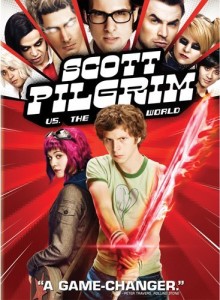This may not be Disney, but I guess this is me getting back to the tradition of using movies for my images.
So…You vs. the World. Well, when put like that, it sounds pretty daunting, doesn’t it?
On the bright side, it doesn’t have to be. We’re all faced with this conflict in one way or another.
“What do you mean by this conflict?” you might ask.
Well, the aim of advertising is to get us to buy something, whether or not the product will actually benefit our lives – but it turns out that a lot of advertising has another, perhaps more sinister effect. Advertisers really want us to buy, so they often do their very best to convince us that we don’t just want their product…we need it. Those of us that have watched super-cheesy infomercials know just how far that can be taken. However, the exaggerations and deceptions aren’t always so obvious.
Even when they’re not as “cheesy,” though, ads still serve the same purpose, and use the same psychological triggers and techniques to get us to buy things. They display fantasies about what life is like with their product – see everyone smiling, life is good, because you’ve got this new TV, kitchen knife set, whatever. The message is that this is what you need to be happy. We see the fantasy that the ad displays, and quite often part of us wants to buy. If the commercial has served its purpose, the audience is now convinced that we can’t be happy like the family on TV (for example) unless we have that “thing” in our lives. In other words, the commercials and other ads we see are intentionally trying to create a feeling of lack in our lives. Where we were at peace before, we have a sense of missing something now. To quote Leo Babauta, “We all of a sudden are not complete, not happy, because we don’t have the fantasy lives. We aren’t good enough yet. We aren’t happy yet.”
That…is quite psychologically damaging. And that’s what ads WANT to do – the supposed “positive outcome.” It sounds dramatic, but as I think about it, it makes sense. We can even be aware of how an ad is affecting us and still be somewhat susceptible to it.
It’s still somewhat sad for me to realize that a large part of our societal structure is designed around actively trying to make us feel unhappy. Whether it’s the number one priority or not, I think all of us have spent a significant amount of time in our lives thinking about the subject of happiness – and in my experience happiness makes EVERYTHING else easier to do, as well.
However, it should be obvious that I don’t talk about this just to try and get you to worry about it. Sitting and worrying about something is such a pointless and fruitless activity, after all. And even though I titled this post as “You vs. the World,” none of us are alone in this struggle. Even people who aren’t trying to live minimalist lifestyles realize that many times more things are advertised to them than they can possibly buy – and we all have to find our way of dealing with that.
There are many strategies that people come up with – minimalists seem more likely to limit their exposure to ads than most. I give myself rules (the same set of rules might not work so well for other people) about buying things. It’s why shopping with a list is so important…ESPECIALLY if you’re shopping on line. Most people don’t talk about bringing a shopping list online, but to me, I consider it even more critical than bringing one to a physical retail store.
Every once in a while, something DOES catch my eye. (Anyone out there who has managed to be untempted by something new for years, please tell me how you’re doing that.) Anyways, I have a rule for myself not to buy it for at least 48 hours, whether it’s in a retail store or online. Those of you who have read my books may have heard me talk about that before. 🙂
In any case, there are other rules as well. If there is a great deal of intentional scarcity for a product, then I am intensely skeptical, and feel like they’re trying too hard to get me to buy it. “Limited Time offers” have surely created great opportunities sometimes, but the whole concept is around trying to make you feel hurried and make an impulse purchase. I want my decisions to be centered around whether I want something in my life for a LONG time to come – classic or necessary items with real staying power. I find those kinds of things don’t just go away. (Though as I said, necessity is a big factor – if there’s a limited time offer to get a whole bunch of diapers for your baby at a cheaper price than normal, GO RIGHT AHEAD.)
So yes, “you vs. the world” is probably a dramatic way of putting it, but I do feel a flair for the dramatic come on every once in a while. What do ya’ll think? What role does advertising play in your life, and do you want to change that role? Go ahead and tell us your thoughts in the comments below.





I do believe all the ideas you’ve presented for your post.
They’re really convincing and can certainly work. Still, the posts are too quick for starters.
Could you please prolong them a little from next time?
Thanks for the post.